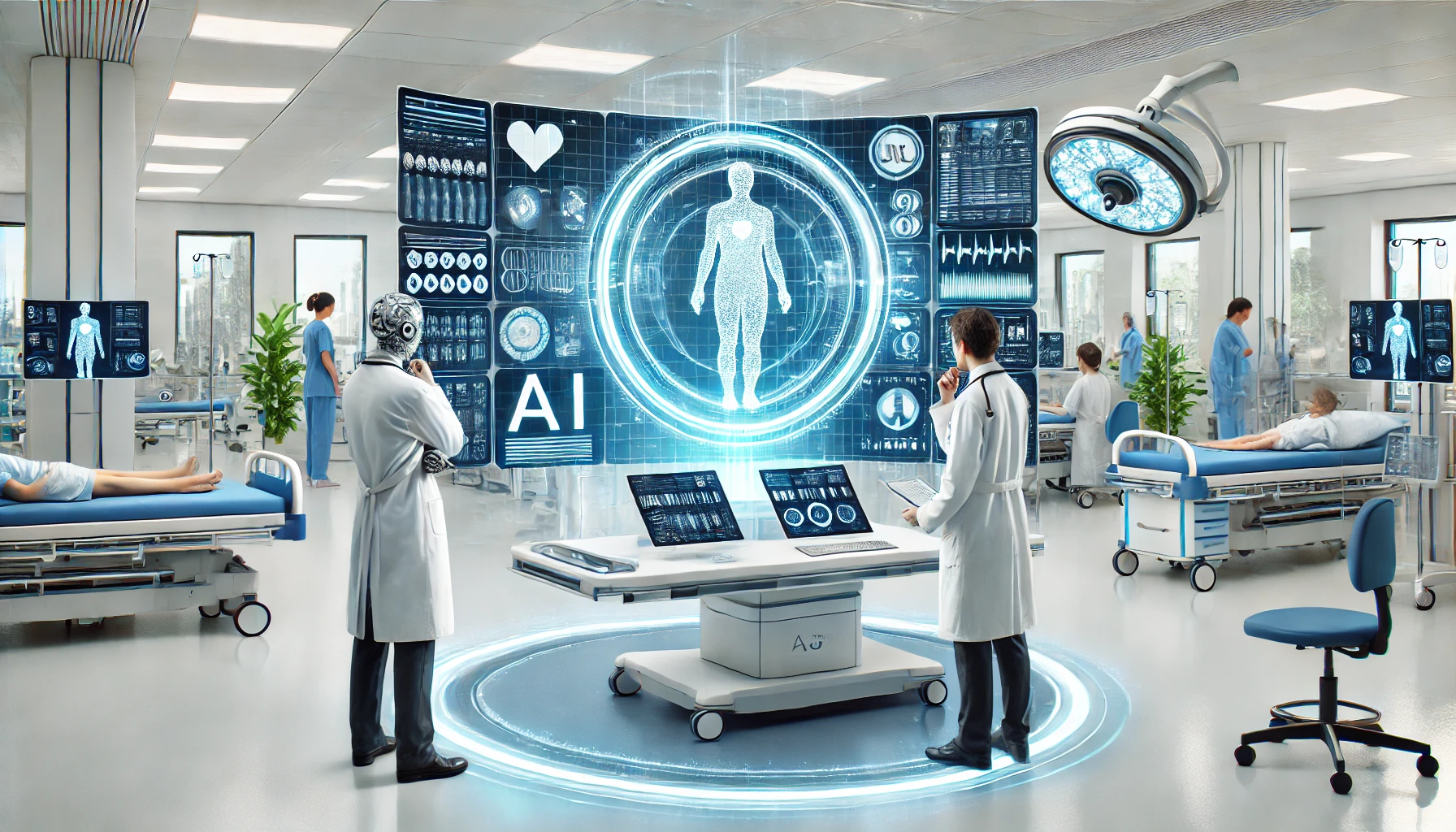
Benefits of AI in Healthcare
Artificial Intelligence (AI) is revolutionizing the healthcare industry, bringing about significant advancements in patient care, operational efficiency, and medical research. The integration of AI technologies has transformed traditional healthcare practices, offering numerous benefits that enhance the overall quality of healthcare services. Here are the key benefits in detail:
1. Improved Diagnostic Accuracy and Speed
AI algorithms, particularly those using deep learning and neural networks, can analyze complex medical data such as imaging scans, pathology slides, and genetic profiles with remarkable accuracy and speed. For instance:
- Radiology and Imaging: AI-powered systems can detect abnormalities in X-rays, MRIs, and CT scans more accurately than human radiologists. This is particularly beneficial in detecting early-stage cancers, fractures, and neurological conditions.
- Pathology: AI tools assist pathologists in identifying cancerous cells by analyzing biopsy samples at a microscopic level, reducing the chances of human error.
- Genomics: AI aids in interpreting genetic data, enabling personalized medicine by predicting disease risks based on genetic markers.
2. Enhanced Patient Care and Experience
AI improves patient care by enabling personalized treatment plans and enhancing patient engagement.
- Personalized Medicine: AI analyzes patient data, including medical history, lifestyle, and genetics, to develop customized treatment plans, ensuring better outcomes.
- Virtual Health Assistants: Chatbots and virtual assistants powered by AI provide round-the-clock patient support, answer queries, and schedule appointments, improving patient engagement and satisfaction.
- Remote Monitoring: AI-driven wearable devices track vital signs in real-time, enabling proactive healthcare management, particularly for chronic disease patients.
3. Operational Efficiency and Cost Reduction
AI streamlines administrative tasks and optimizes hospital operations, leading to cost savings and improved efficiency.
- Automated Administrative Tasks: AI automates billing, insurance claims processing, and appointment scheduling, reducing paperwork and administrative burden.
- Predictive Analytics for Resource Management: AI helps predict patient admission rates, optimizing staffing, and resource allocation, reducing wait times and enhancing hospital efficiency.
- Supply Chain Optimization: AI predicts inventory needs, minimizing waste and ensuring the availability of critical medical supplies.
4. Accelerated Drug Discovery and Development
AI significantly speeds up the drug discovery process, reducing costs and time required for bringing new drugs to market.
- Molecular Analysis: AI models analyze molecular structures and predict their effectiveness as drug compounds, identifying potential drug candidates faster.
- Clinical Trials Optimization: AI selects suitable candidates for clinical trials, increasing success rates and reducing trial durations.
- Drug Repurposing: AI identifies new uses for existing drugs, accelerating the availability of treatments for emerging diseases.
5. Precision Surgery and Robotics
AI enhances surgical precision and outcomes by assisting surgeons with advanced robotic systems.
- Robotic Surgery: AI-guided robotic systems provide enhanced dexterity, stability, and precision during surgeries, minimizing human errors.
- Surgical Planning and Navigation: AI creates 3D models from medical imaging, assisting surgeons in preoperative planning and real-time navigation during complex procedures.
- Post-Surgical Monitoring: AI monitors patient recovery, predicting complications and facilitating timely interventions.
6. Predictive Analytics for Preventive Healthcare
AI leverages big data and predictive analytics to foresee health risks and enable preventive care.
- Early Disease Detection: AI models analyze patient data to predict the likelihood of diseases such as diabetes, cardiovascular conditions, and cancer, enabling early intervention.
- Population Health Management: AI identifies at-risk populations, helping healthcare providers design preventive healthcare programs.
- Pandemic Prediction and Management: AI analyzes global health data to predict disease outbreaks, supporting proactive public health measures.
7. Mental Health Support and Cognitive Assistance
AI is instrumental in advancing mental health care and cognitive support.
- Mental Health Chatbots: AI-powered chatbots provide cognitive behavioral therapy, emotional support, and crisis intervention, making mental health services more accessible.
- Cognitive Assistance for Dementia Patients: AI assists dementia patients with reminders, navigation, and daily activities, enhancing their quality of life.
- Mood and Behavior Analysis: AI tools analyze speech patterns, social media activity, and wearable data to detect signs of depression, anxiety, and other mental health conditions.
8. Enhanced Medical Research and Data Analysis
AI accelerates medical research by analyzing vast datasets, uncovering patterns, and generating actionable insights.
- Medical Imaging Research: AI analyzes large volumes of medical images, contributing to research in radiology, oncology, and neurology.
- Clinical Data Analysis: AI extracts insights from electronic health records (EHRs), facilitating research on disease progression, treatment outcomes, and patient demographics.
- Real-World Evidence Generation: AI processes real-world data from wearable devices and patient feedback, supporting evidence-based healthcare decisions.
9. Integration with IoT and Smart Devices
The integration of AI with the Internet of Things (IoT) enhances remote patient monitoring and personalized healthcare.
- Smart Wearables: AI-enabled wearables continuously monitor vital signs such as heart rate, glucose levels, and blood pressure, alerting healthcare providers in case of abnormalities.
- Smart Home Healthcare Devices: AI-powered devices assist in medication management, remote consultations, and chronic disease monitoring from the comfort of home.
- Telemedicine Integration: AI enhances telemedicine platforms with advanced diagnostic tools and remote patient monitoring capabilities.
10. Ethical Considerations and Future Potential
While AI offers numerous benefits, ethical considerations are crucial for responsible implementation.
- Data Privacy and Security: Ensuring patient data confidentiality and compliance with data protection regulations.
- Algorithm Transparency: Maintaining transparency in AI decision-making processes to build trust among healthcare professionals and patients.
- Equitable Access to AI Healthcare Solutions: Ensuring AI-driven healthcare benefits are accessible to all population segments, including underserved communities.



 DailyMediCure
DailyMediCure 









